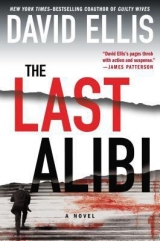
Текст книги "The Last Alibi"
Автор книги: David Ellis
Жанры:
Триллеры
,сообщить о нарушении
Текущая страница: 12 (всего у книги 31 страниц)
41.
Jason
“Good afternoon, Detective Cromartie. I’m Shauna Tasker. I represent Jason Kolarich.”
“Counsel.” Cromartie coughs into his fist and eyeballs Shauna.
“Detective, you are familiar with the concept of gunshot residue, or GSR?”
“I am,” he says. “But it doesn’t—”
“It was a simple question, Detective. Are you or aren’t you?”
Cromartie frowns. He also pauses, wondering if either Roger Ogren or Judge Bialek will rise to his defense. But they won’t. Judge Bialek usually likes to give witnesses a little freedom to elaborate on answers—especially because if they have something meaningful to say, they’ll end up saying it, anyway, when the other side gets to ask questions—but Cromartie was going too far with a simple question.
“I am familiar with it,” he says, tucking in his lips, his attention enhanced now. He’ll be more careful next time, a little more reticent to stray too far. Good for Shauna. Cromartie is probably an old-schooler; how he was going to react to questioning by a woman was anyone’s guess. We’re not guessing now.
“Gunshot residue, or GSR, is residue of the combustion components of a firearm after it discharges a bullet, correct?”
“Correct.”
“Basically, when a gun fires, the primer and powder combust and create an explosion.”
“That’s right.”
“And GSR is the residue from that combustion. Residue, dust, particles might be found on the arm or wrist or hand of an individual after they’ve fired a gun. Is that correct?”
“Emphasis on the word might,” Cromartie says. “It might leave residue. It might not.”
“Well, the reason you perform a GSR test is to determine whether an individual has fired a gun recently, correct? That’s why you do the test?”
“Yes, it’s a crude test, but that’s the idea.”
Shauna properly ignores that remark. “On the night of Ms. Himmel’s death, you had Jason’s hands swabbed for GSR at his house, isn’t that true?”
“Yes, I believe we swabbed his hands at some point after we arrived. What Mr. Kolarich did before we arrived is un—”
“You answered my question, Detective. And the results of the GSR test you performed on Jason were negative, correct? No gunshot residue was detected.”
Cromartie, realizing he’s again getting no help from Roger Ogren, stops fighting. “That’s correct.”
“Very good.” Shauna, who hasn’t looked down at her notes once, now reviews them, flips a page. More for a segue than anything else. I’m going to revise my assessment of Cromartie as a witness. He’s fighting unnecessarily with Shauna. All the counterpoints he wanted to make—the GSR test isn’t perfect; I might have washed up, even taken a shower before calling the police to remove any residue from my hands—he will make in redirect with Roger Ogren. To fight with Shauna here has diminished him and highlighted the strength of our position. I would expect more from a veteran cop, and more from Ogren, who probably figured he didn’t need to tell Cromartie these basics, Testifying 101.
“We heard excerpts of your interrogation of my client following the death of Ms. Himmel, didn’t we?”
“We did.”
“This interview took place at four in the morning, correct?”
“Yes.”
“My client hadn’t had any sleep prior to the questioning, correct?”
“Any sleep? No, neither of us had slept.”
“And he was dealing with the loss of a woman with whom he’d shared a romantic history, isn’t that true?”
I like how Shauna phrased that. When she was mock-crossing Cromartie in our office, with me playing Cromartie, I kept nailing her when she said the loss of his girlfriend. Saying it the way she did now—a woman with whom he’d shared a romantic history—sounded innocuous enough but was meaningfully different.
“Dealing with the loss? If killing someone means you’re dealing with the loss, then yeah, I guess he was, y’know, dealing with the loss. It’s kind of like killing your parents and then asking for mercy from the judge because you’re an orphan.”
That line gets some snickers from the gallery, one person laughing outright. The answer jars Shauna to attention. She could object and move to strike the statement, but she doesn’t.
“You don’t know my client killed Alexa Himmel, do you, Detective?”
“It’s what I believe.”
“But you don’t know that for a fact, do you?” She approaches the witness.
“For a fact? I know the evidence strongly—”
“It’s up to these good men and women of the jury to make that decision, isn’t it, Detective?”
He gives an exaggerated sweep of his head. “Of course it is.”
“You don’t get to play accuser and juror, do you, Detective?”
He raises a hand, almost smiling. “Luckily, I do not.”
“The evidence will decide this case, not you. Is that okay with you, Detective?”
“Objection,” Roger Ogren says. “Argumentative.”
“Sustained.” The judge looks over her glasses at Shauna. “We get the point, Ms. Tasker. Let’s move on.”
Shauna, thankfully, doesn’t miss a beat. “My client was sleep-deprived, and a woman with whom he’d been romantically involved for several months had just been found dead in his house. Isn’t that all true, Detective?”
Cromartie starts to answer but pauses, his eyes on the ceiling. “I don’t know about sleep-deprived. It was late, yes. All of us were probably tired.”
“And on top of that,” says Shauna, “my client was under the cloud of a painkiller addiction at the time of the interview, wasn’t he?”
“Oh, objection.” Roger Ogren springs to his feet. “Sidebar, Judge?”
The judge waves him forward. She steps off the bench over to the corner of the courtroom, away from the jury box. The court reporter picks up her stenography machine and joins the attorneys and judge.
I can’t hear them any more than the jury can, but I have a pretty good idea how this conversation is going to go. Shauna and I argued the point, with me playing Roger Ogren, several times over the past week.
Shauna is going to argue that the prosecution plans to use my OxyContin addiction against me, and thus my addiction is fair game. Roger is going to say that there’s no actual proof of my addiction, certainly not at the time of the interrogation, unless I take the stand and testify to it. And Shauna will reply that I received treatment while in custody for my addiction, and she will call the counselors to the stand if necessary to lay the foundation, but she can’t believe Ogren will make her go to that trouble.
I think we’ll win the point, but just to be sure, we had Shauna ask the question first, so the jury would hear it either way.
Shauna makes eye contact with me as she leaves the conference, betraying no emotion but telling me it worked out for us. “Let me restate the question,” she says, reclaiming her spot in the center of the courtroom. “Detective, isn’t it true that at the time my client was speaking with you, he was under the influence of an addiction to a painkiller called OxyContin?”
Cromartie, of course, has had a long time to consider his answer. “I asked the defendant at the beginning of the interview if he was under the influence of any drugs at that time and if he was able to speak with a clear mind, and he said he was able to speak with a clear mind.”
A standard pre-interrogation question, to prevent exactly the type of cross-examination that Shauna is conducting now.
“You didn’t answer my question, Detective.”
“I think I did, Counselor.”
“Then let me ask it again, and the judge can decide. Detective, isn’t it true that at the time my client was speaking with you, he was under the cloud of an addiction to a painkiller called OxyContin?”
That’s three times she’s gotten to say it. And Ogren doesn’t object, because she’s not asking whether I admitted to being addicted at the interrogation—I didn’t—but whether it was true, regardless.
“I don’t know if he was or he wasn’t,” Cromartie says. “I asked him and he said no. That’s all I knew at the time.”
“I’m talking about what you know now, Detective. Are you telling this jury that, as you sit here today, you don’t believe that my client was suffering from an OxyContin addiction at the time you questioned my client? Is that really your testimony?”
“I didn’t say that. We’ve come to believe that the defendant did have that addiction, yes. It’s nice to hear you admit it. I didn’t realize you would.”
Nice jab. The addiction is the third rail in this trial. It plays a significant role in the prosecution’s narrative, a major piece of Roger Ogren’s story that ends with my killing Alexa. Given our choice, Shauna and I would have liked to deny the whole thing. But the problem is that I’ve been treated in jail for the problem, so I can’t really deny it. So instead, we’re embracing it, trying to make the most of it. Shauna will argue to the jury that I was impaired when I submitted to the interview with the police. It can explain some of the—ahem—ambiguities in my statements.
But it cuts the other way, too. It gives the jury a vision of me that is not flattering—out of control, desperate, irrational, quite possibly dangerous, capable of doing things that, ordinarily, would be beyond a well-heeled attorney. Picture those old meth commercials—This wasn’t supposed to be your life!—or the old egg-frying-in-a-pan, This is your brain on drugs ads.
Addiction freaks people out. It scares them.
And it makes it far, far more plausible to the jury that I killed Alexa Himmel.
FIVE MONTHS BEFORE TRIAL
July
42.
Jason
Monday, July 1
My town house has shrunk in on me over the last thirty-six hours, since I paid the visit to James Drinker and found out I was chasing a ghost. I’ve kept Alexa away, ignored phone calls from Joel Lightner, secluded myself in my house to think.
Who is this guy? Who is this man who waltzed into my office in disguise, giving an alias, and telling me about dead women?
I think through every permutation and always come back to the same thing: I have history with this man. I prosecuted him. I prosecuted someone he cares about. Or I defended him, or someone he loves, with a result he didn’t like, and now he wants to blame the lawyer.
I’ve tried to create a list of every case where I appeared as counsel, but it’s impossible to get it anywhere close to complete. When you’re a prosecutor in a major system like ours, you start with small stuff, traffic and misdemeanor and drug courts. Then you do a stint in juvenile courts, where the records are sealed. Then you’re third-chairing bigger cases, and then after several years, you start handling your own major crimes.
I’ve prosecuted hundreds of people, probably thousands, each of whom has loved ones. The list of suspects is endless. And that’s only the ones I can remember. The county attorney’s office doesn’t keep a list of such things. And with all the courtrooms I bounced around, all the different kinds of cases, it’s impossible to come up with anything close to a complete list.
I need to talk to this guy. I need to search for clues. But I don’t have a phone number for him. He never gave me one and he always calls from an unknown number, probably one of those throwaway cell phones, ten bucks at a convenience store, another ten for a hundred minutes.
He probably knows I went to 3611 West Townsend, apartment 406, and accosted the real James Drinker on Saturday night. He probably knows I’m twisting myself inside out trying to come up with something to make sense out of all of this.
I remove an Altoid and chew it up. I’m not keeping track. I’ve been good, if that’s the word, about holding down these tablets to one every two hours. I think I’m off that now. I don’t know. I’m not focused. I’m wide awake but half asleep at the same time. I’m buzzing with adrenaline while dozing off. All color is muted, tamped down with gray. All lines are blurry and shifting.
Alexa sends me a text message at two o’clock—I’M OUTSIDE YR DOOR, PLS LET ME IN!—so I go downstairs and open up. She puts her hands on my cheeks and peppers me with kisses like a child, wraps her arms around me, reassures me that everything will turn out fine, just fine. I’ve given her the highlights of what happened, so she recognizes as well as I the emptiness of her words.
When my cell phone buzzes at close to three o’clock in the afternoon, I nearly come out of my skin. I’ve received plenty of calls, and every time, my nerves rattle and my stomach revolts. I’m dreading the very thing I want—a call from the mystery man.
I approach the kitchen counter with trepidation, looking at the phone and mumbling something when I see that word on the face of the phone: Unknown.
What an appropriate word for him.
“Jason!” It’s him. James Drinker, but not James Drinker.
I don’t say anything. This guy does everything for a reason. He has a reason for this call, too.
He chuckles, makes sure I can hear his amusement. Part of the game. “I guess we both know my name isn’t James Drinker. What would you like to call me?”
Asshole? Lowlife? Dead man?
“Your call,” I say.
“Ooooh. Maybe I’ll give something up, he thinks. Maybe I’ll give a name that will tip him off, he thinks.”
“Tell me why this is happening,” I say. “Tell me what you want. You want me to say I’m sorry for something I did? I’ll say it. But don’t take it out on innocent people. These women did nothing to you.”
“How do you know they did nothing to me, Jason? You don’t know that.”
“You said you didn’t know Alicia Corey or Lauren Gibbs.”
“That doesn’t mean they didn’t do something to me. People can be cruel to people they don’t know. In my experience, crueler than they are to people they know.”
I don’t respond to that. If I’m going to get anything out of this conversation at all, he has to do most of the talking. He knows that, of course. He knows I’m searching for a clue. It doesn’t mean he won’t give me one, though. He may not be able to resist.
“Come after me,” I say. “Take it out on me, not them.”
“How do you know I’m not?”
My hands ball into fists. One day, I think to myself, one day I will get my hands on this creep.
“They’re going to catch you,” I say. “However good you may think you are, serial killers get caught.”
“Not all of them. The Zodiac Killer didn’t. The BTK guy basically handed himself over. So did the Unabomber, unintentionally. It’s amazing, isn’t it? How easy it can be to kill people and get away with it?”
“You’ve made mistakes,” I say. “You’ve left a trail, even if you don’t know it.”
“Oh, I’ve left a trail, all right. But it won’t lead to me. You haven’t been paying attention, Jason.”
The line disconnects. I drop the phone and wipe sweat off my forehead. I look over at Alexa, who is watching me, eyebrows raised. I go upstairs to find my computer.
43.
Jason
Monday, July 1
I go online and start with Google. I put in the name of the first victim, Alicia Corey, the stripper from Knockers.
“You’re going to get a thousand hits because of the press coverage,” Alexa says, standing over my shoulder.
“I don’t know how else to do it.”
She’s right, though; the coverage was even more intense than I’d realized. There are dozens of articles from newspapers in the Midwest and even some in The New York Times and the L.A. Times, articles picked up from a wire service, no doubt, as the small string of words that accompany each hit are usually identical. There are also numerous entries from Facebook and Myspace, “Alicia Corey” being a fairly common name. There’s even a professional fighter by that name.
“Go there,” Alexa says, pointing to a link that says Alicia Corey Reward.
I click on it, a Facebook page, bearing the same title and a large photograph of Alicia Corey, an attractive blond woman who, in the picture, has her head slightly angled back while she lets out a large laugh. Underneath it, the heading contains a long note:
Our dear friend Alicia Corey—Lisha to those who knew her best—was taken from us on May 22 when she was tragically and brutally murdered in her home on the north side of the city by a killer now known as the North Side Slasher. Lisha was a ray of sunshine every day, a gentle woman with a terrific sense of humor and a giving soul. Dr. Dennis Molitor, DDS, where Lisha worked as a dental hygienist for three years, is offering a $10,000 Cash Reward for any information leading to the arrest of the monster responsible for this senseless act of violence.
The note ends with an address and an e-mail where information may be sent. Underneath it, the page is filled with comments from well-wishers and grievers—We love and miss you, Lisha! Our prayers are with your family. Please let me know how I can help. You’re with God now, Lisha. Alicia was one of my finest students at Saddlebrook Middle School back in 2000 . . .
“That’s nice of him to do, the cash reward,” Alexa says. “Don’t you think?”
I bring a hand to my mouth, close my eyes. The initial news reports had just mentioned her nighttime job as a stripper. I guess that’s more of a grabber, sexier than dental hygienist.
“Jason?” She nudges me with her elbow.
“Yes, it’s very nice of him,” I say. “Dr. Molitor’s a great guy.”
She puts her hand on my shoulder. “You know him?”
“He’s my dentist,” I say. “I got a tooth filled in May.”
It doesn’t take us long to find the rest of them, now that we know what we’re looking for. Lauren Gibbs, the website designer and bank teller, worked at Citywide Bank in the Commercial District branch, where I banked. She was killed on May 24. I visited the bank to order some new checks, with my new address, in early May. Holly Frazier, the grad student who part-timed at Starbucks, was a barista at the location just down the street from our law firm, the place I buy coffee nearly every morning.
Nancy Minnows worked at my favorite store, Runner’s High, as a salesperson. She was the blond dreadlocked girl, Minnie, who sold me shoes and running gear a couple of weeks before she was butchered like the others.
And Samantha Drury was the African-American librarian who was working when I stopped in to write my anonymous note to the police about James Drinker.
I think again of what “James” said to me the other day on the phone, a conversation that sent ice down my spine, words I won’t ever forget, when he discussed his connections to the victims. For all I know, one of them sold me clothes or served me coffee or cleaned my teeth or deposited my check at the bank. And now we can add to that, waited on me at the library.
Or close enough, at least. I don’t recall Alicia Corey cleaning my teeth at Dr. Molitor’s—and to judge from her photo, I’d remember her—but James wouldn’t have known that level of detail. He would have followed me, but not all the way into the dentist’s inner office. I don’t think Lauren Gibbs was the person who helped me order new checks at Citywide Bank, but the truth is, I don’t remember one way or the other. Holly Frazier probably did serve me coffee at some point, but she’s one of a thousand pretty young women you see in the city and doesn’t stand out to me. Nancy Minnows, of course, was my salesperson at Runner’s High, which James could have seen just by passing by the window. Just as easily, he could have seen me walk past the librarian at the front desk, hidden from absolutely nobody.
Either way, whether I directly contacted them or was nearby, I was close enough to have met them, to have laid eyes on them. Maybe I coveted them, “James” had said to me, taunting me over the phone. Maybe I watched them, everywhere they went, obsessed over them . . . Maybe that’s exactly why I chose them. Because my encounter with them was so casual and short that nobody would even remember it.
He was following me, identifying pretty young women with whom I came into contact, and murdering them. The story he hypothesized to me is exactly what the police will say, if they ever get around to discovering me.
“Those places would all have security cameras,” I say. “A bank, a Starbucks, the library, the running store. The dentist office, maybe not, but it wouldn’t be hard to pull a patient list.” I look over at Alexa. “I’m on record in each of these places.”
“This can’t . . . this can’t be happening,” Alexa whispers.
“It’s happening.” I blow out air. “This asshole is setting me up.”
44.
Jason
Tuesday, July 2
The next morning, Alexa goes with me to Joel Lightner’s office. The sign outside his door on the seventh floor says JDL PARTNERS, a suitably vague name for a company that serves customers who value discretion. He works from referrals, no print ads or fancy websites. He has a row of offices on the west side of the building, his own the largest, but decorated tastefully and simply. He doesn’t want clients to think he’s getting rich off their troubles, though he is.
Joel gives a warm greeting to Alexa, whom he’s only seen once at a glance when she visited my office the first time. Normally he’d turn on the Lightner charm, crack wise, try to get the pretty girl to laugh, but current circumstances dictate otherwise.
When Alexa is taking a seat, Joel catches my eye and gestures at her with a question on his face. He’s asking me if I’m sure I want her to be here for this sensitive conversation. But I do. Alexa knows my darkest secret; if she can be trusted with that, she can be trusted with anything.
Joel paces along his window, which gives us a view into a concrete skyscraper across the street. It is drizzling outside, teardrops on the glass.
“It’s not much,” he says. “Yes, if the cops are good, if they’re looking that hard at security tapes, they might put you at each location.”
“They can easily put me at the dentist office,” I say. “And I put down a credit card at Runner’s High. Those two alone, right? I mean, that’s what the police are doing right now. They’re gathering data and cross-referencing. What do these women have in common?”
Joel makes a noise, his finger on his lips, pacing around. “That’s what I’d do.”
“And once they see where I work, it won’t be hard to imagine I went to that Starbucks. Send a cop over there to show the employees my photograph, and they’ll say, ‘Oh, yeah, he comes in all the time.’ The security cameras will just confirm it. And it will take them a grand total of five minutes to learn that I have bank accounts at Citywide, and that I was there recently at the district branch.”
“Okay, okay.” He holds out a calming hand. “But—you have no motive. You’re a successful lawyer. You’ve taken on some big cases, well-known cases. The Governor Snow thing. That thing with the terrorist attack, Jason. And now, suddenly, you’re a psychotic serial killer who guts women with a knife?” He shakes his head. “It doesn’t fly. I might find some significance in your connection to these victims, but I wouldn’t think you killed them.”
Now I’m pacing the office, too. One wall of Joel’s office is devoted to old photographs from the Terry Burgos case. Sometime in the late 1980s, Burgos killed seven—I think it was seven—college students and prostitutes on a small college campus in a town just south of the city called Marion Park. Joel was the lead detective on the case, the one who arrested Burgos, who interrogated him and obtained a confession that helped defeat his insanity defense at trial. The case launched his career. It’s the first thing any potential client knows about him, that he was the guy who once caught a serial killer.
“Do you . . . do you have alibis for the murders?” Joel asks with an embarrassed laugh, as if he can’t believe he has to ask me that question.
“Yes, he does,” Alexa says. “He was with me. Every one of those nights.”
I turn away from the wall and look at her. Joel has a look of relief on his face until he catches my eye.
A knock at Joel’s door. Standing in the threshold is one of Joel’s investigators, a young, attractive blond woman. As much of a pig as Joel is, he didn’t hire her for her looks, or at least not in the way that would normally mean. He hired her because she can get people to do things she wants, a nice trait for a private eye who might need a peek at a sign-in sheet, the name of a hotel guest, or a particularly well-placed spot in a restaurant. Her name is Janet or Jennifer or Jessie or something.
“What’s up, Linda?” Joel asks.
Right. Linda. That was my next guess. It occurs to me, as I look at her, that she’s fantastic, a true head-turner, and that under ordinary circumstances I might experience at least, I don’t know, a mild adrenaline rush or something. Like I remember what it was like to feel normal, something that’s just across the room from me but might as well be on another planet.
“Need you for one second, Joel, when you can.”
“Go ahead,” I say to him. “We can wait.”
Joel and Linda huddle briefly in the hallway outside. Alexa is still facing forward, toward Joel’s chair, and I’m behind her across the room. I let the silence fill the air.
Finally, she turns her head back to see me and says, matter-of-factly, “We were together each of those nights.”
“Sorry,” Lightner says, popping back in. “Anyway. What were we—oh, the alibis,” he says, dropping into his chair.
“Alexa and I need to figure that out,” I say. “Confirm those dates.”
Alexa shoots a glance my way but doesn’t say anything.
“Okay, definitely do that.” Lightner nods, casting alternate looks at Alexa and me. “Here’s the thing, though,” he says. “Just putting you at a location where you had the chance to come into contact with these people isn’t enough. By itself? Not nearly enough, especially for a professional like you. If you had a criminal record or a history of mental illness or you had some dead-end job or something, maybe. But you’re too buttoned-up a guy, a successful professional. The fact that you happened to come into contact with each of them? It’s just . . . not enough.”
“Well, that’s good, then.” Alexa opens her hands. “Right?”
“That’s not what he’s saying,” I interject. “What he’s saying is, if the asshole formerly known as James Drinker is any good at what he’s doing, there’s more than what we know so far.”
And Joel’s absolutely right. There has to be more that he has on me. And I helped him with ideas, for God’s sake. That scumbag sat in my office while I gave him a fucking tutorial on how to frame somebody for murder.
Joel points at me. “We have to figure out what he has on you. Because whatever he has on you, he could use it any day.”








